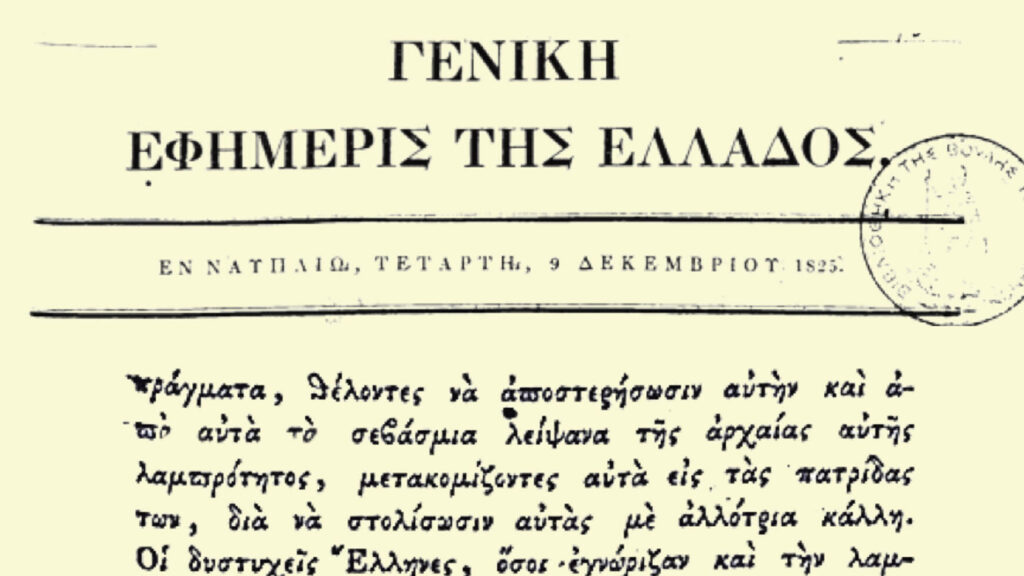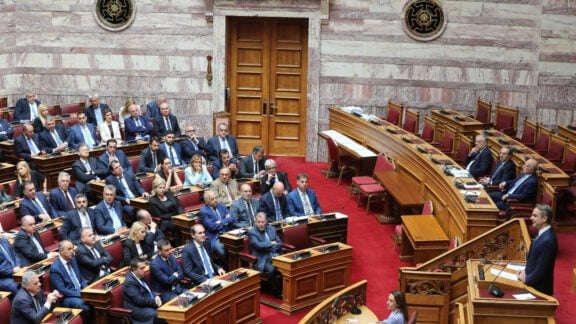Preamble: Konstantinos Gkioulekas, lawyer, journalist and New Democracy MP, and author of the Greek language book; The Chronicle of the Revolution Through the Newspapers of the Revolution, sent a letter to the editor of Neos Kosmos, Sotiris Hatzimanolis, outlining how as far back as 1821, during the Revolution for Independence, the revolutionaries, the nascent Greek state and new Greek media were active in denouncing Lord Elgin’s theft or the Parthenon Sculptures along with other Europeans pilfering Greece’s antiquities. Gkioulekas provides primary sources from that period.
Below is the Letter translated from Greek:
Dear Mr Hatzimanolis
I am contacting you following British Prime Minister Rishi Sunak’s offensive behaviour during the Greek Prime Minister’s [Kyriakos Mitsotakis] recent visit to London.
Knowing our [Greece’s] position on the Parthenon Sculptures and the Greek attitude towards this issue in general, I want to add to the quiver of Greek arguments additional elements, which may be helpful in any discussion on the issue of the return of the Sculptures to Greece.This theft of Greek antiquities by European powers had been denounced since the Greek Revolution of 1821.
Revolutionary Greeks in newspapers published during the struggle for our independence raised the issue of the removal of antiquities by Europeans.
These Europeans, in collusion with the Turkish administration, proceeded to steal them, taking advantage of the chaotic situation that prevailed in Greece. The revolutionaries denounced the theft by Lord Elgin in an article in the Newspaper of Athens on January 17, 1826, titled, On Antiquities.
The masthead from that period, devotes most of its space to the illegal seizure of antiquities and their export to various European countries. It is, as the revolutionaries write, a “shameful act of foreigners, who, in collaboration with the Turks, are seizing ancient relics”, as the newspaper says, “to adorn their homelands.”

In the Newspaper of Athens report, the Greeks accuse Lord Elgin of the theft of various antiquities and their ill-treatment.In the same issue of Newspaper of Athens is a letter by the General Secretary of the Administration Alexandros Mavrokordatos to the Dutch Colonel Rottiers – who also stole antiquities from Milos; in the letter, he accuses him of “dishonourable acts”.
Mavrokordatos’ letter states that “Many Europeans, in collusion with the Turkish administration, are stealing antiquities from Greece and taking them back to their homelands.
General Gazette of Greece, a year earlier, on December 9 1825, published a report that referred to “many foreigners who had snatched antiquities from Greece.”
In addition, by order of February 22 1826, the Executive Body of the Provisional Administration of Greece, apart from recognising that all antiquities are a national matter and their preservation is necessary, also talked about how antiquities should be preserved in Greece.
National Governor, Ioannis Kapodistrias, on June 28 1830, issued a circular to the Commissioners and the Governors of the Territory, setting the framework and the measures taken to protect Greek antiquities.
All of the above details are in my latest book, “The Chronicle of the Revolution Through the Newspapers of the Revolution.”
It is crucial to note that the new Greek state began to immediately protest about the theft of our antiquities when we were still fighting for our freedom in the Revolution of 1821.
And for 200 years, we have been denouncing those acts of theft by Europeans and demanding the return of what belongs to us.I have sent similar letters to the prime minister, the speaker of parliament, cabinet members, and members of parliament of all parties.









